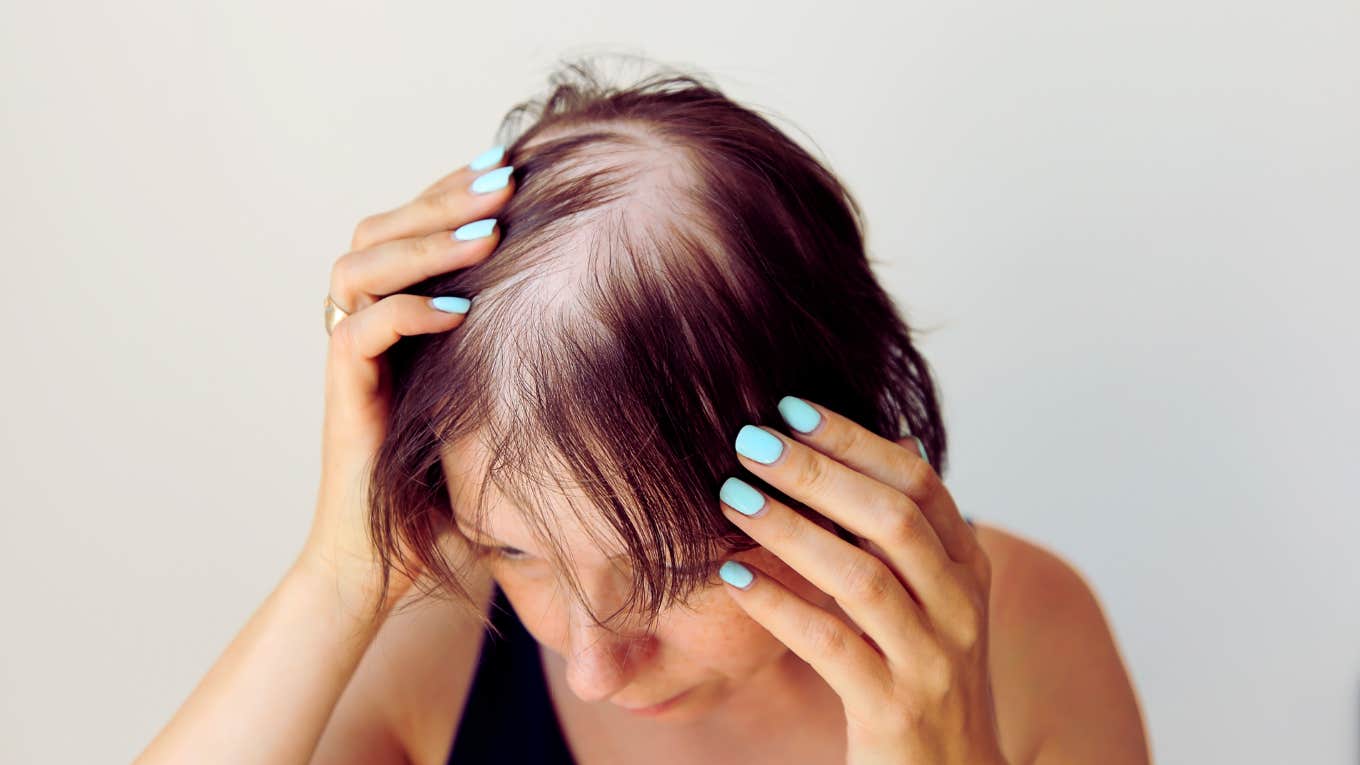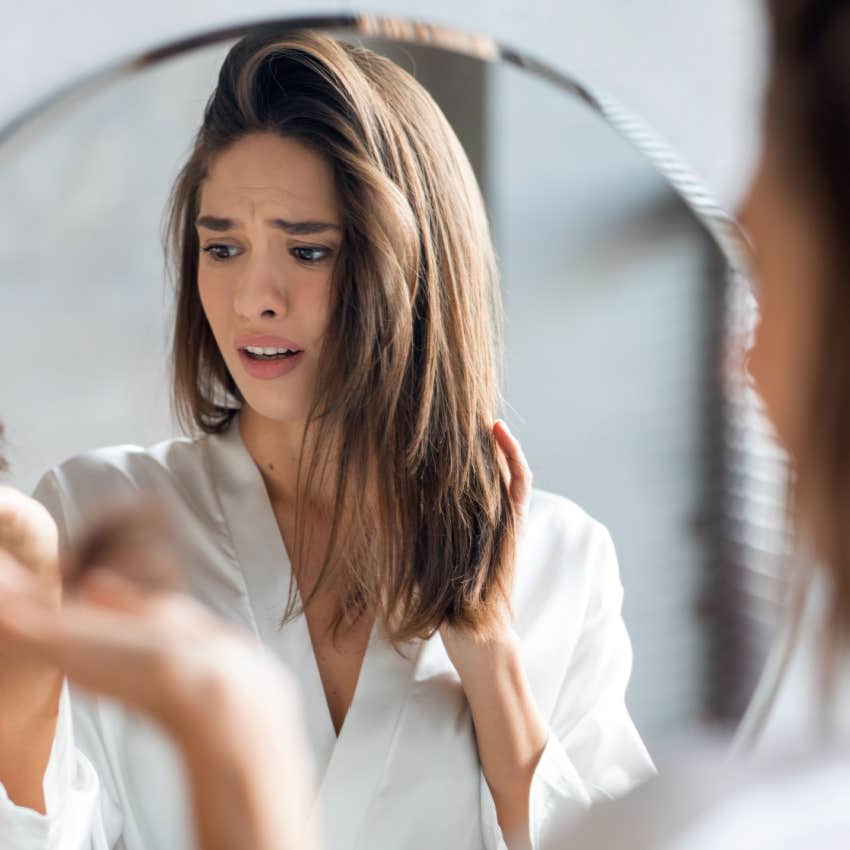I Lost Most Of My Hair In My 30s, And My Self-Esteem Plunge Nearly Ended Me
Truths I wish I'd known earlier about going bald.
 Kolabava Nadzeya | Shutterstock
Kolabava Nadzeya | Shutterstock Growing up, I always admired my younger sisters’ long, thick manes of hair. My middle sister’s glossy, long black tresses had just enough reddish highlights that they shone with coppery streaks in the sunlight. My youngest sister’s head of hair was so thick that if she went to bed without drying it, it would still be damp the next morning.
I wasn’t so lucky. Though my dark brown hair was super fine and baby-soft, the top of my scalp was visible in just the right light and wouldn’t grow past the tops of my shoulders. “At least it was easy to wash and dry quickly,” I consoled myself.
During pregnancy, I discovered my hair at its finest. For my first two children, I enjoyed those few months of being able to grow it longer and thicker, but things changed when I was expecting my third. As I cared for my young family, my heart raced until I felt faint. At night, its pounding cadence was loud, and my pulse never slowed. I was very sick.
Relieved to give birth to a healthy son, I thought the worst was over, only to lose most of my hair several months later. I could tell this wasn’t the normal shed most women experience after giving birth, but something much different: I had alopecia.
At first, I tried to ignore it, thinking if I pretended nothing had happened, maybe no one else would notice. The first time someone commented on my thinning hair, I was so mortified I wanted the earth to swallow me up.
Next, I combed in topical products to thicken the remaining hair. Dark brown smudges were left on my clothing and the furniture where I sat. Bright overhead lighting and direct sunlight would reveal that my thicker-looking hair was only an illusion, so I sequestered myself at home unless I had to go out to church or one of my sons’ school events.
Despite the isolating feelings of shame, I told myself that I was blessed to have a loving husband. Then, amid this struggle, my husband was diagnosed with terminal cancer; my last defense was being stripped away.
It’s hard to explain what going bald as a woman is like. “It’s just hair,” my closest friends and loved ones would tell me. Yet, it was much more than that. In many cultures, a woman’s hair is often seen as a symbol of her femininity, health, and beauty. It gives us social standing and shapes our identity.
If you don’t believe me, imagine being told tomorrow you needed to shave your head to save your life on the condition your hair would never return. What would it feel like to go out in public for the first time? To try and meet a romantic interest? To walk into a social gathering under these conditions.
Often, those who are the quickest to brush off this as meaningless vanity find themselves unable to face a loss of this magnitude. For a while, nightmares of being found out as a bald woman plagued my sleep, and I toyed with thoughts of suicide.
Shortly after my husband’s death, I steeled myself and walked into a local wig shop. A kindly, petite woman helped me sort through the dizzying hair pieces on display. An hour later, I walked out wearing my first human hair/synthetic blend wig.
Shame slowed my wig care journey. I found it embarrassing to search the internet for information, and few sites offered detailed tips since this was still the early days of online video tutorials. It wasn’t until the end of a second marriage to an abusive man that I decided to shed the last of my hesitation about being a wig wearer. Today, I received a complimentary piece from WigShe, an affordable retailer in the women’s human hair wig market. This gift got me thinking about my hair loss journey and what I wish I could go back and tell my 30-something self.
Here are 4 truths I wish I'd known earlier about going bald:
1. We like to believe we’re in complete control of our appearance and overall health, but that’s a lie
There are many health-related issues we have no control over, only how we’ll respond to them, including the quality and thickness of our hair.
2. Shame over one’s appearance is mostly a social construct
Throughout history, we have elevated certain body types, usually, the harder-to-attain ones, to create an illusory class of elitism. Embracing our particularly quirky human traits unabashedly is the quickest way to undermine this social stigma.
3. Hair loss among women is more common than it appears
Studies show that over 40% of women will experience significant hair loss at some stage. It remains primarily an invisible problem because many women are very good at disguising it. Please know that you are not alone.
 Prostock-studio / Shutterstock
Prostock-studio / Shutterstock
4. Beauty is much more than the length of one’s hair; it’s the whole of a person that defines their loveliness
Anyone who judges you based on the number of hairs on your head, reveals more about their character than yours.
Kerry Kerr McAvoy, Ph.D., a retired psychologist and author, is an expert on cultivating healthy relationships and deconstructing narcissism. Her blogs have been featured in Mamami, YourTango, Scary Mommy, and The Good Men Project. She hosts the Breaking Free from Narcissistic Abuse podcast and offers trauma-related advice on social media.

